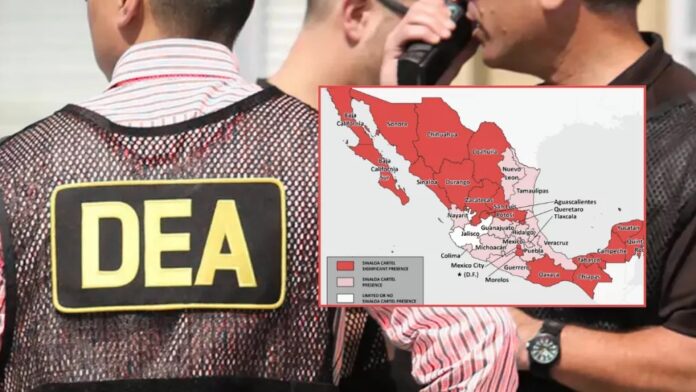The U.S. Drug Enforcement Administration (DEA) has confirmed that the Sinaloa Cartel and the Jalisco New Generation Cartel (CJNG) maintain an operational presence in the Mexican state of Campeche, a development that experts say signals a worrying shift in the region’s security situation.
According to a recent report released by the DEA in its 2025 National Drug Threat Assessment, the Sinaloa Cartel has a significant presence in Campeche, one of 31 Mexican states where it operates. The document also reveals that this powerful criminal organization has a global reach, with operations in over 40 countries and a network that includes clandestine laboratories and maritime routes for importing precursor chemicals from Asia.
The DEA describes the Sinaloa Cartel as one of the world’s most powerful criminal structures, responsible for producing and distributing vast quantities of illicit substances, including fentanyl, methamphetamine, cocaine, heroin, and marijuana. The organization’s influence extends far beyond Mexico’s borders, with its synthetic drug network generating millions of doses annually.
Campeche is part of southeastern Mexico, a region where both the Sinaloa Cartel and CJNG have been identified as having significant operational presences. This marks a significant shift in the dynamics of organized crime in the area, which has historically been considered off the radar of major cartels.
The CJNG, meanwhile, is highlighted in the report as one of Mexico’s most violent and influential transnational criminal organizations. The cartel’s operations span over 40 countries and include a powerful financial arm, Los Cuinis, which specializes in money laundering through the use of cryptocurrencies, remittances, front companies, and illicit trade schemes.
A potential strategic alliance between the CJNG and Los Chapitos, a rival faction within the Sinaloa Cartel, could further alter the country’s criminal landscape, facilitating the expansion of territory and resources and provoking further escalations of violence.
Both cartels are involved in a range of illicit activities beyond drug trafficking, including extortion, human trafficking, arms trafficking, and real estate fraud schemes. These actions seek to diversify revenue and protect their operations from legal embargoes and public security actions.
The capture of key Sinaloa Cartel leaders earlier this year has sparked an internal crisis within the organization, which the CJNG may exploit to gain ground and establish new alliances that further shift the country’s criminal dynamics.
The DEA concludes that both the Sinaloa Cartel and CJNG represent a significant threat to public health, internal security, and international stability, with their influence extending to regions such as Campeche, where no high-profile operations by these groups have previously been reported.
Source: Por Esto




